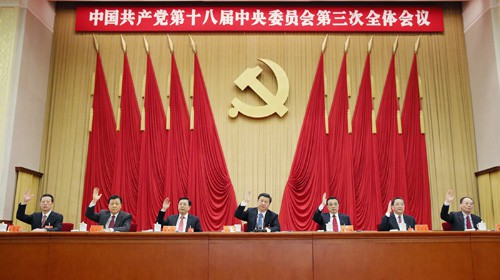|
 |
|
CARVING OUT FUTURE REFORMS: Top Chinese leaders vote at the Third Plenary Session of the 18th CPC Central Committee in Beijing on November 12 (LAN HONGGUANG) |
Seven years ago, Yang Guanglin and his family said goodbye to their rural village life and made the move to Chengdu, capital of Sichuan Province. Yang picked up work on construction projects while his wife waited tables in a small restaurant. The migrant couple and their only son have been battling against the odds to put down roots in the city.
Despite the fact that the family can save around 20,000 yuan ($3,282) a year, they never feel a sense of belonging in the city.
"I don't have a Chengdu hukou (permanent household registration certificate)," Yang told People's Daily. "I cannot enjoy the same benefit as the city dwellers do."
Social Security and education are two biggest headaches for Yang. And he is just one of the hundreds of millions of migrant workers in China who flock to cities to seek a better life and, despite their hard work, they hardly feel welcome in their new urban locales.
However, a ray of hope shone through the gloom of migrant workers' plights after the closure of the Third Plenary Session of the 18th Central Committee of the Communist Party of China (CPC), held November 9-12 in the nation's capital of Beijing.
During the four-day, closed-door session, Chinese leaders vowed to establish a more fair and sustainable social security system for both urban and rural residents. According to a communiqué released after the plenary session, more efforts will be made to improve social welfare and deepen institutional reforms to ensure social justice and equality.
The third plenary sessions of the CPC Central Committee often focus on reform. China's landmark reforms in the late 1970s started right after the Third Plenary Session of the 11th CPC Central Committee held in 1978. The reform and opening-up policies have brought China more than three decades of rapid economic expansion.
The recently concluded 204-member 18th CPC Central Committee plenary session, which has drawn attention from around the globe, marks the starting point of a new round of comprehensively deepening reforms in the world's second largest economy.
The general objective of the reform is to improve and develop socialism with Chinese characteristics and push on with the modernization of the country's governing system and capabilities, according to the communiqué.
This round of comprehensive reform will go far beyond economic changes and will cover the socialist market economy, democracy, cultural development, social harmony and ecological matters.
Issues singled out for change included establishing a central leading team for reform; giving the market a more important role in allocating resources; creating a better social security system; giving farmers more property rights over collectively owned rural land; establishing a unified land market in cities and the countryside; setting up a state security committee; deepening fiscal and tax reform; cracking down on corruption; fostering judicial independence and more.
The pending reforms, like any reform in the world, are bound to face stiff resistance from vested interest groups. It's going to be an arduous task, according to analysts.
Highlights
China's top leaders have been emphatic about reforms and have repeatedly called for comprehensively deepening reform on many occasions.
Since the 18th CPC National Congress held in November 2012, when Xi Jinping and Li Keqiang were selected as top Party leaders, the two have made 17 inspection tours of the country, all leading to calls to the urgency of deepening reforms.
On a visit to central China's Hubei Province in July 2013, President Xi talked about the methodology of comprehensively intensifying reform. Reform, he said, is a balance between creativity and reality, between urgent breakthroughs and comprehensiveness, between the leadership and the grassroots, between courage and care, between reform, development and stability.
To that end, China will set up a central leading team for reform. The team will be in charge of designing reforms on a holistic basis—arranging, coordinating, and pushing forward reforms as a whole—as well as supervising the implementation of reform plans, according to the communiqué.
A top-level team and an emphasis on "top-level design" suggest a more decisive reform push by the new leadership, said analysts.
Wang Yukai, a professor of the Chinese Academy of Governance, said such a team is vital for future comprehensive reform, which is bound to go well beyond economic changes.
Wang added that China is currently facing four major risks: economic slowdown, mounting income disparity, a crisis of confidence and corruption.
"Only by deepening reform in an all-round manner can China solve those crises," said Wang.
"China's reform has reached a turning point, which requires concerted efforts in all areas, including economic, political, social, cultural and ecological reforms. It's imperative to have such a team for top-level institutional designs and overall coordination. With such a team, reforms in all areas will be carried out in a coordinated way, not only focusing on economic reforms as in the past."
| 